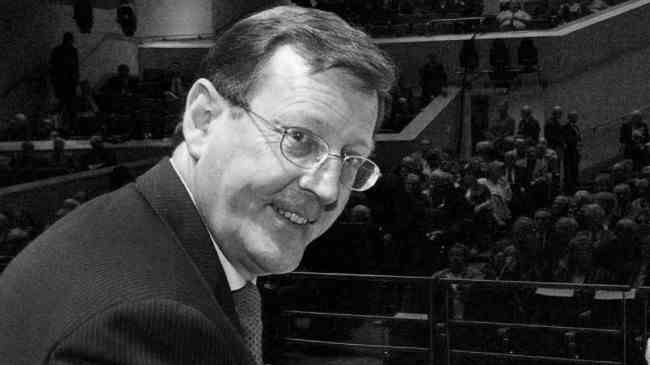In July 1995 David Trimble, then MP for Upper Bann for the Ulster Unionist Party (UUP), marched hand in hand with radical Protestant leader Ian Paisley down Garvaghy Road in Portadown, Northern Ireland. The street was mainly inhabited by Catholics, the so-called “Dumcree Parade” of the Protestant Orange Order here an annual provocation. The authorities had forbidden them to avoid riots. The fact that Trimble finally managed to push through the Catholic area cemented its reputation as a Unionist hardliner, for whom British dominance in Northern Ireland was a political condition sine qua non.
One has to visualize this scene in order to grasp the enormous and rapid political development David Trimble underwent in the following three years: from defender of the conflict-ridden status quo to pioneer and architect of the so-called Good Friday Agreement. It ended decades of spiraling violence in the Northern Ireland conflict and brought Trimble, together with the Catholic politician John Hume, the 1998 Nobel Peace Prize.
Elected to represent an unyielding course
Little had been said about this development in Trimble’s biography: born in Belfast in 1944 to a ministry clerk and a secretary and raised in Bangor in the Protestant heartland of Northern Ireland, he studied law at Queen’s University before becoming a lawyer and lecturer. In the 1970s he was initially involved in the radical unionist Vanguard Party, but then switched to the UUP, of which he became chairman in September 1995.
He had been elected to represent an intransigent course, but soon took a pragmatic direction that surprised many observers. As the first Unionist party leader since the 1920s, he negotiated with Sinn Féin, the political arm of the IRA, and pushed these talks forward despite opposition from much of his own parliamentary group. David Trimble was short-tempered, which some of his companions attributed to the fact that he was basically a shy person who often overreacted when he felt offended.
But he proved a clever tactician in negotiations with the British and Irish governments and the Catholics of Northern Ireland. The resulting Good Friday Agreement, signed in Belfast on 10 April 1998 by British Prime Minister Tony Blair and Irish Taoiseach Bertie Ahern, restored Northern Ireland’s self-government on a power-sharing basis. It gave Protestants and Catholics equal civil, political and cultural rights, led to police reform, the disarmament of paramilitary groups on both sides and the early release of paramilitary prisoners, followed by the demilitarization of Northern Ireland.
As part of the agreement, Trimble was appointed as Northern Ireland’s first First Minister. Although his five-year tenure was marked by ongoing political infighting, which resulted in dramatic gains for more extreme parties on both sides of the sectarian divide in the 2003 Northern Ireland election, the Good Friday Agreement held. But in May 2005, Trimble was defeated in the general election by a candidate from Ian Paisley’s more radical Democratic Unionist Party, which replaced the UUP as the main political force in the Protestant camp.
The following year Trimble was appointed for life to the House of Lords and made Baron Trimble of Lisnagarvey. More recently, although fundamentally a Brexit supporter, he has been vocal in his opposition to the so-called Northern Ireland Protocol, which was part of the 2019 Brexit deal and left Northern Ireland legally within the EU’s single market. Lord Trimble argued it was jeopardizing the Good Friday Agreement, which he has consistently described as “the greatest achievement of my life”. David Trimble, the reformed radical and Nobel Peace Prize winner, has died at the age of 77 after a short, serious illness.

